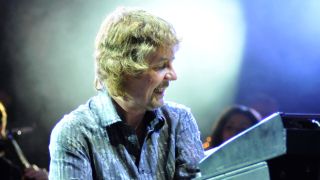On April 18, Lou Reed, Green Day, Ringo Starr, Joan Jett and others will be inducted into the Rock And Roll Hall Of Fame, joining everyone from The Beatles, the Stones, Led Zeppelin, Pink Floyd and The Who to Kiss, Metallica, ZZ Top and, er, ABBA. But what about all the bands this US institution has overlooked, ignored or wilfully snubbed over the years? The giants and innovators of rock, prog, punk, blues and more who weren’t deemed important enough, cool enough or American enough to warrant entry through those hallowed portals. Nearly 50 years after forming, Deep Purple are the greatest band not to be in the official Hall Of Fame. They are one of a diminishing handful of bands who formed in the late 60s who are still active today, who are not content to rest on their laurels and who still exist in a meaningful and creative way. While many of their peers are content to play the chicken-in-a-basket circuit – their tour posters emblazoned with monochrome mug shots of how they looked back in their bushy-tailed heyday – Purple have matured like a fine, expensive wine (a Sweet Burgundy, as their former guitarist, the late, great Tommy Bolin, might have it). From 1968’s Shades Of Deep Purple to 2013’s NOW What?!, Purple’s passage through time resembles a mountain range of breathtaking highs and turbid lows. Via a series of interviews with every key member past and present, we celebrate Purple’s extraordinary, multi-decade career. We highlight the radically different personalities of the musicians who have impacted on the band, and marvel at how these contradicting characters were able to gel musically. We examine the mysterious – and occasionally devious – workings of this at times most volatile of bands. We analyse the contributions of alleged bit-part players including Nick Simper, Joe Lynn Turner and the aforementioned Bolin. Plus much more besides. This is Deep Purple dissected, deconstructed and laid bare. (Oh, and we only mention Smoke On The Water once.)
As a classically trained player, do you believe great musicians are born and not made?
They’re definitely born. Certainly the really great ones are. There’s truth in the phrase ‘Ten per cent genius, ninety per cent perspiration’. People with talent – somebody like Jimmy Page, for example – will just plough on through. They can’t help themselves. It’s a compulsion.
Besides the travelling, what else don’t you like about being in Deep Purple?
I actually love the travelling. What I’m not so keen on is arriving at your destination on a night off before the show. You get to your hotel room and you’re on your own. That can make you feel a bit lonely.
Are Purple not the type of band to hit a bar together?
That does go on, but it doesn’t always. And when you’re all alone, that’s when homesickness kicks in. It’s a very funny feeling.
Did you attend Jon Lord’s funeral?
I was still working on my parts for the album [NOW What?!]. My plane got back right on the day he was being buried. I wish I’d been able to go, as Jon was so nice to me when I joined Purple. He gave me few pointers, including: “Stay out the way of Paice’s drum fills.”


